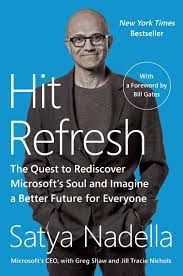Satya Nadella, the Microsoft CEO who stayed with the important as its essential PC programming business blurred, could compose a book about the difficulties he confronted. Also, he has however it’s not a tell-all journal. Rather, Nadella, who has worked at the organization since the mid 1990s, has situated himself as the exemplification of the story Microsoft needs to tell about its change into a ground breaking outfit concentrated on manmade brainpower, cloud programming, virtual universes and quantum figuring.
“Microsoft is known for rallying the troops with competitive fire,” Nadella writes in Hit Refresh, his new autobiography. “The press loves that, but it’s not me.”
Nadella isn’t reckless or straightforward in the way of his antecedents or a significant number of his Silicon Valley peers. His mindfulness emerges in an industry known for huge consciences and cumbersome separation from this present reality. He rambles about compassion and care. The individuals who know him say he would not joke about this.
A PASSAGE FROM INDIA
Nadella’s book relates some individual and expert battles, including points of interest not broadly thought about his childhood in India and changing in accordance with his youngsters’ inabilities.
In a shocking entry about the “unreasonable rationale” of US movement law, Nadella uncovers how amid his initial a very long time at Microsoft, he surrendered the security of a green card — which awards lasting American residency — for a transitory work visa since it was the main way his better half, Anu, could go along with him in the United States.
“I went back to the US embassy in Delhi in June of 1994, past the enormous lines of people hoping to get a visa, and told a clerk that I wanted to give back my green card and apply for an H-1B,” Nadella writes. “He was dumbfounded.”
Risking his career gave him instant notoriety on the Microsoft campus. “Anu was my priority,” he writes. “And that made my decision a simple one.”
NONVIOLENT COMMUNICATION
In the main official meeting after Nadella assumed control from his forerunner, Steve Ballmer, in 2014, Nadella brought a duplicate of a book about peaceful correspondence for everybody in the room.
“It was a tad bit of a shock,” said Microsoft President Brad Smith. “Steve Ballmer was not some individual who got books. There was certainly a feeling this was something else.”
Nadella doesn’t take any shots at Microsoft’s fellow benefactor and first CEO Bill Gates — who composed the book’s forward — or Ballmer. Be that as it may, he’s blunt about their contradictions, particularly finished Ballmer’s terrible $7.3 billion obtaining of Nokia’s telephone business in 2014. Nadella additionally alludes to the organization’s past hierarchical structure as a “confederation of fiefdoms” and describes negative input got from worker overviews and messages.
“The company was sick,” Nadella writes. “Employees were tired. They were frustrated. They were fed up with losing and falling behind despite their grand plans and great ideas. They came to Microsoft with big dreams, but it felt like all they really did was deal with upper management, execute taxing processes and bicker in meetings.”
LEARNING FROM MISSTEPS
In a book loaded with techno-confidence and excitement about the organization’s future, it’s about as basic as Nadella gets. He additionally to a great extent directs far from political discussion, but to dismiss remarks about Asian tech administrators once made by Steve Bannon, President Donald Trump’s previous boss strategist.
“Even when some people in positions of power have remarked that there were too many Asian CEOs in technology, I’ve ignored their ignorance,” Nadella writes, without naming Bannon. Trump barely merits mention — and gets no criticism — although the index references several pages about former President Barack Obama, all positive.
Even Nadella’s biggest public controversy — a 2014 comment suggesting that women don’t need to push for pay raises — has become a lesson in how business leaders should acknowledge their mistakes, said Maria Klawe, president of Harvey Mudd College and a former Microsoft board member who was interviewing Nadella when he made the remarks.
His swift apology cast Nadella “as a very different kind of leader from Bill Gates and Steve Ballmer,” his two predecessors, Klawe said. “Somebody who has a lot more humility and is a lot more willing to learn.”
He promises not to squander the new energy felt by employees after years of frustration. So far, it seems to be paying off; Microsoft shares have doubled since he took the top job in early 2014, and the company is attracting buzz for its work in AI, augmented reality and a new effort in futuristic computing.
“I think he has built a much more collaborative culture,” Klawe said. “He has made people believe in the future of Microsoft in a way that neither Bill nor Steve really did.”









